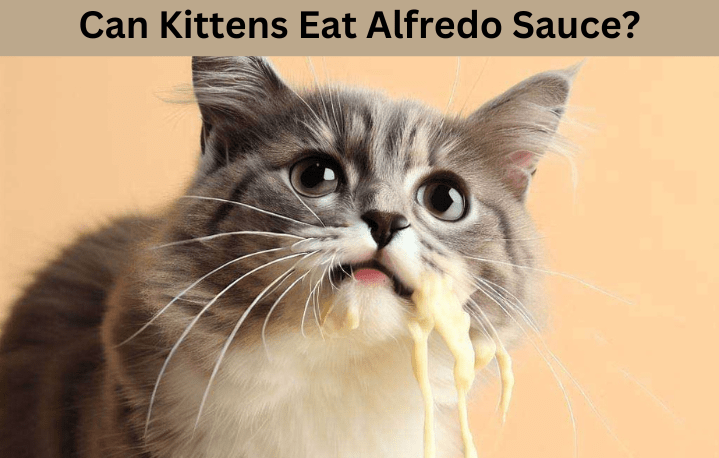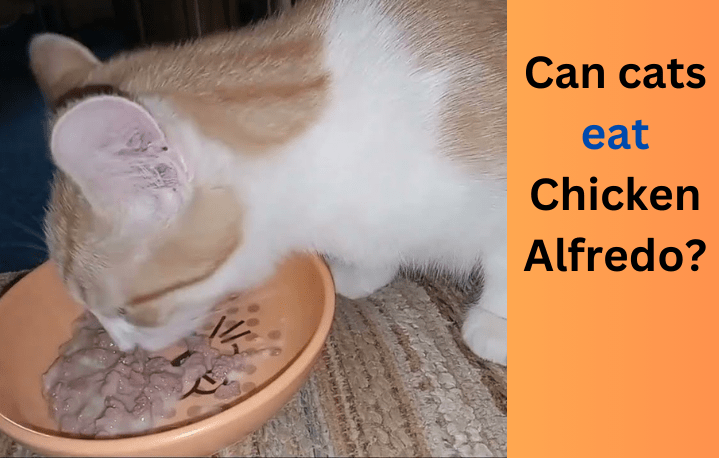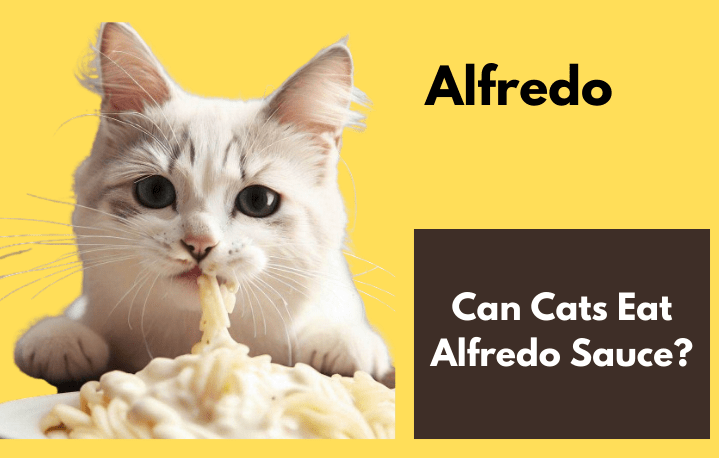Have you ever wondered if your cat can enjoy a bite of your creamy pasta dish? Alfredo sauce is a popular and delicious sauce that many people love to eat with pasta, chicken, or seafood. But Can cats eat Alfredo sauce? is it safe for cats to eat?
In this article, we will answer all your questions about cats and Alfredo sauce. We will tell you what Alfredo sauce is, how much a cat can eat Alfredo sauce, whether it is toxic or not, and how to prevent your cat from eating it. We will also give you some cat-friendly alternatives to Alfredo sauce that you can try.
Contents
- 1 What is Alfredo Sauce and Can cats eat Alfredo sauce?
- 2 How Much a Cat Can Eat Alfredo Sauce?
- 3 Is Alfredo Toxic to Cats?
- 4 How to Prevent Your Cat from Eating Alfredo Sauce?
- 5 Can Kittens Eat Alfredo Sauce?
- 6 Is pasta sauce safe for cats?
- 7 Can my cat eat pasta?
- 8 Can cats eat Chicken Alfredo?
- 9 Can cats eat fettuccine Alfredo?
- 10 What sauces are safe for cats?
- 11 What are Some Alternatives to Alfredo Sauce for Cats?
- 12 Conclusion
What is Alfredo Sauce and Can cats eat Alfredo sauce?
Cream, cheese, and butter are the ingredients of Alfredo sauce, a white sauce. It is usually seasoned with salt, pepper, garlic, and parsley. It was invented in Rome, Italy, by a chef named Alfredo di Lelio in the early 20th century.
He created the sauce to please his pregnant wife, who had lost her appetite. He served it with fettuccine, a type of pasta, and the dish became known as fettuccine Alfredo.
Alfredo sauce became popular in the United States after some American celebrities visited Alfredo’s restaurant and praised his dish. Since then, many variations of Alfredo sauce have been created, adding different ingredients such as chicken, shrimp, broccoli, mushrooms, etc.
How Much a Cat Can Eat Alfredo Sauce?
The short answer is very little, if any. Alfredo sauce is not a suitable food for cats for several reasons. First, it is very high in fat, calories, and sodium, which can cause obesity, diabetes, heart problems, and kidney issues in cats.
Second, it contains dairy products, such as cream and cheese, which many cats are lactose intolerant to. This means that they cannot digest the milk sugar in dairy and may experience diarrhea, vomiting, gas, and bloating.
Third, it may contain garlic and onion, which are toxic to cats. These ingredients can damage the red blood cells and cause anemia in cats. Therefore, if you want to give your cat a taste of Alfredo sauce, you should limit it to a very small amount, such as a lick or a spoonful, and only occasionally.
You should also check the ingredients list and avoid any sauce that contains garlic, onion, or other harmful substances. You should also monitor your cat’s reaction and stop feeding them Alfredo sauce if they show any signs of discomfort or illness.
Is Alfredo Toxic to Cats?
As we mentioned above, Alfredo sauce can be toxic to cats if it contains garlic or onion. These ingredients belong to the Allium family, which also includes leeks, chives, and scallions.
They contain a compound called thiosulfate, which can cause oxidative damage to the red blood cells and lead to hemolytic anemia in cats. Hemolytic anemia is a condition where the red blood cells are destroyed faster than they can be replaced, resulting in low oxygen levels in the body.
The symptoms of garlic or onion toxicity in cats include weakness, lethargy, pale gums, rapid breathing, increased heart rate, vomiting, diarrhea, and blood in the urine.
If you suspect that your cat has ingested garlic or onion, you should contact your veterinarian immediately and seek emergency treatment. The prognosis depends on the amount and type of Allium ingested, the time elapsed since ingestion, and the cat’s overall health.
How to Prevent Your Cat from Eating Alfredo Sauce?
The best way to prevent your cat from eating Alfredo sauce is to keep it away from them. Here are some tips and strategies to do that:
- Store your Alfredo sauce in a sealed container and place it in the refrigerator or a high shelf that your cat cannot reach.
- Make sure to leave your Alfredo sauce on the table, counter, or stove. Your cat may be tempted to jump and lick it when you are not looking.
- Do not feed your cat from your plate or share your food with them. This will encourage them to beg for more and develop a preference for human food.
- Use a deterrent spray or device to discourage your cat from approaching your Alfredo sauce. You can use a citrus-based spray, a motion-activated air canister, or a loud noise maker to create an unpleasant association for your cat.
- Monitor your cat’s diet and behavior. Ensure they eat balanced and nutritious cat food that meets their needs. Provide them with fresh water and clean bowls. Observe them for any changes in appetite, weight, energy, or mood. If you notice anything unusual, consult your veterinarian.
It is also important to talk to your veterinarian before introducing new food to your cat. They can advise you on the best diet for your cat and warn you about any potential risks or allergies.
Can Kittens Eat Alfredo Sauce?
If you are a cat lover and a pasta lover, you might be tempted to share some of your delicious Alfredo sauce with your furry friend. But can kittens eat alfredo sauce? Is it safe for them? The answer is no. Alfredo sauce is not a good choice for cats, especially kittens. Here are some reasons why you should avoid giving alfredo sauce to your cat.

Is pasta sauce safe for cats?
Pasta sauce, whether it is alfredo, marinara, pesto, or any other kind, is not a natural part of a cat’s diet. Cats are obligate carnivores, which means they need meat to survive and thrive.
Pasta sauce does not provide the essential nutrients that cats need, such as protein, taurine, and vitamin A. Pasta sauce can be harmful to cats in several ways.
First
pasta sauce is high in calories, fat, and carbohydrates, which can lead to obesity and diabetes in cats. Obesity is a serious health problem for cats, as it can increase the risk of arthritis, heart disease, liver disease, and other conditions.
Diabetes is also a common and potentially fatal disease in cats, which requires lifelong insulin injections and dietary management.
Second
pasta sauce is high in sodium, which can cause dehydration, high blood pressure, and kidney problems in cats. Cats have a low salt tolerance, as they do not have the same thirst mechanism as humans.
Too much salt can make cats lose water and electrolytes, which can affect their kidney function and blood pressure. High blood pressure can damage the eyes, heart, brain, and other organs in cats.
Third
pasta sauce may contain ingredients that are toxic or allergenic to cats, such as garlic, onion, cheese, cream, butter, and spices. Garlic and onion are especially dangerous for cats, as they can cause hemolytic anemia, a condition where the red blood cells are destroyed.
Cheese, cream, butter, and other dairy products can cause digestive upset, diarrhea, and vomiting in cats, as most cats are lactose intolerant. Spices can also irritate the cat’s mouth, stomach, and intestines, and cause inflammation and ulcers.
Can my cat eat pasta?
Pasta is not a suitable food for cats either. As mentioned earlier, cats are carnivores and do not need carbohydrates in their diet. Pasta is made of wheat, which is a source of gluten, a protein that some cats are allergic to.
Gluten can cause skin problems, itching, hair loss, and digestive issues in cats. Pasta can also cause choking, constipation, or intestinal blockage in cats, as it can swell up in their stomach and intestines.
Can cats eat Chicken Alfredo?
Chicken alfredo is a popular dish that combines pasta, alfredo sauce, and chicken. While chicken is a good source of protein for cats, the other ingredients are not.
As explained above, pasta and alfredo sauce are bad for cats and can cause various health problems. Therefore, chicken alfredo is not a good option for cats either.

Can cats eat fettuccine Alfredo?
Fettuccine alfredo is another variation of pasta and alfredo sauce, with fettuccine being a type of flat and thick noodle. The same reasons that apply to chicken alfredo apply to fettuccine alfredo as well. Fettuccine alfredo is not a healthy or safe food for cats.
Suggested: Tuna Water For Cats
What sauces are safe for cats?
The best sauce for cats is no sauce at all. Cats do not need sauces to enhance the flavor or texture of their food. They are perfectly happy with plain, cooked, and unseasoned meat, fish, or poultry. These are the foods that provide the optimal nutrition and hydration for cats.
If you want to give your cat a treat, you can offer some plain, cooked chicken, turkey, or fish, without any bones, skin, or fat. You can also give your cat some canned tuna or salmon, as long as they are packed in water, not oil or brine, and do not contain any additives or preservatives.
What are Some Alternatives to Alfredo Sauce for Cats?
If you want to treat your cat with something special, you can try some alternatives to Alfredo sauce that are cat-friendly and safe. Here are some examples:
Plain Yogurt
Yogurt is a fermented dairy product that contains beneficial bacteria and enzymes that can help your cat’s digestion. It is also low in lactose, so it is less likely to cause intolerance in cats.
You can give your cat a small amount of plain, unsweetened, and unflavored yogurt as a snack or a topping for their food. Avoid any yogurt that contains artificial sweeteners, such as xylitol, which are toxic to cats.
Cream Cheese
Cream cheese is another dairy product that is low in lactose and high in protein and calcium. It is also soft and easy to spread, making it a convenient treat for your cat.
You can give your cat a small amount of plain cream cheese as a treat or mix it with some canned tuna or chicken for a tasty meal. Avoid any cream cheese that contains garlic, onion, or other harmful ingredients.
Chicken Broth
Chicken broth is a simple and delicious way to hydrate your cat and add some flavor to their food. It is also rich in protein and amino acids that can support your cat’s health. You can make your chicken broth by boiling some chicken bones and meat in water and straining the liquid.
You can also buy some low-sodium and preservative-free chicken broth from the store. You can give your cat some warm chicken broth as a drink or mix it with their dry or wet food. These are just some of the possible alternatives to Alfredo sauce for cats.
You can also experiment with other ingredients that are safe and healthy for cats, such as eggs, salmon, pumpkin, etc. Just remember to follow the same guidelines as for Alfredo sauce: give them in small amounts, check the ingredients list, and monitor your cat’s reaction.
.
Conclusion
Alfredo sauce is a delicious sauce that many people love to eat, but can cats eat Alfredo sauce? it is not a good food for cats. It is high in fat, calories, and sodium, and it may contain dairy, garlic, onion, or other toxic substances that can harm your cat’s health.
If you want to give your cat a taste of Alfredo sauce, you should limit it to a very small amount and only occasionally. You should also keep it away from your cat and prevent them from eating it. You can also try some alternatives to Alfredo sauce that are cat-friendly and safe, such as yogurt, cream cheese, or chicken broth.




